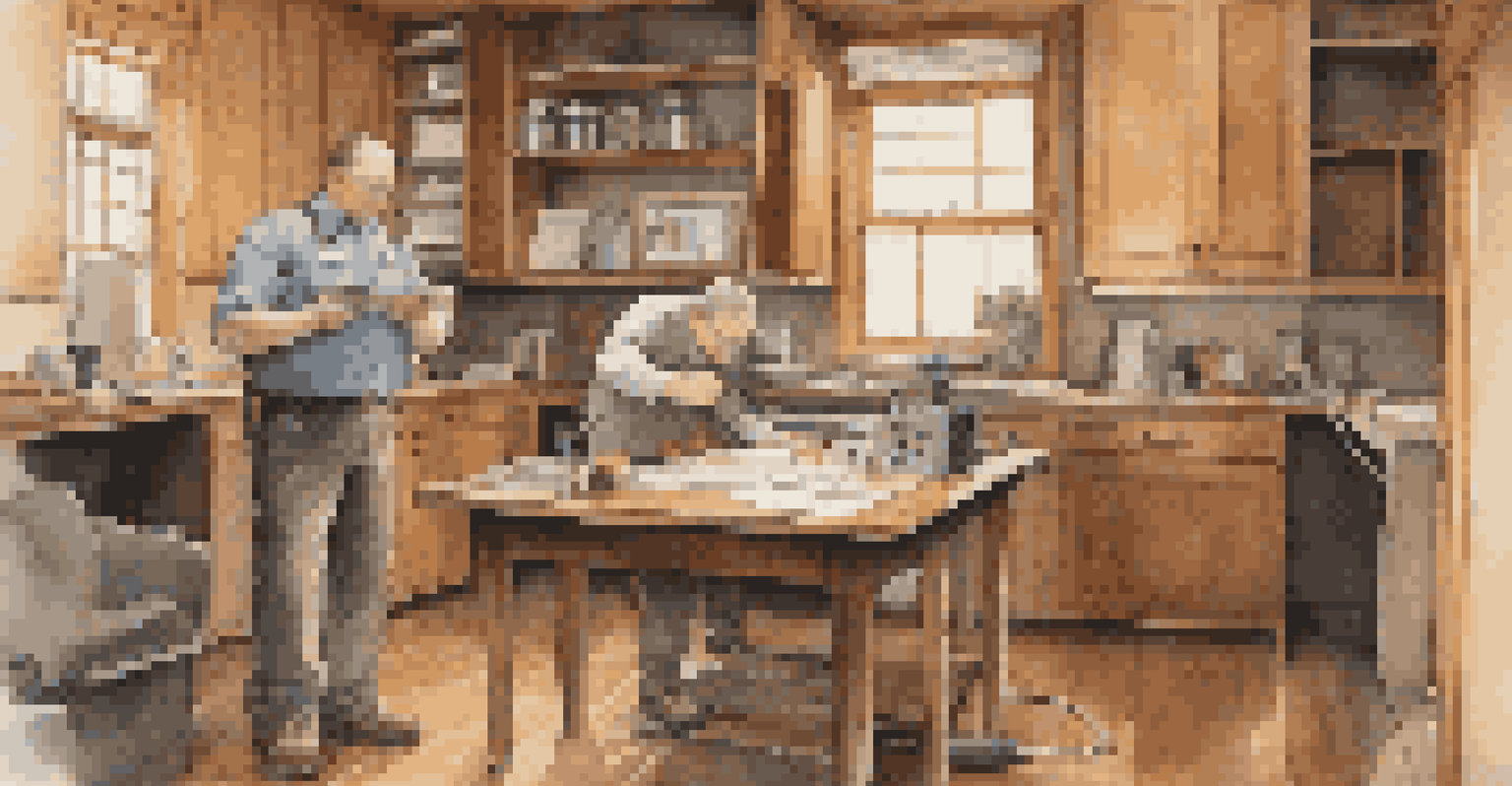Home Inspections: A Safe Pathway to Successful Renovations

Understanding the Importance of Home Inspections
Home inspections are often overlooked, but they play a crucial role in renovations. They help uncover hidden issues that might not be visible to the untrained eye. Think of an inspection as a health check-up for your home, ensuring everything is in good shape before you dive into a renovation project.
An ounce of prevention is worth a pound of cure.
When you conduct a home inspection, you gain insights about the structural integrity, plumbing, and electrical systems. These factors are essential to know because they can affect the scope and budget of your renovation. By identifying potential problems early, you can avoid costly surprises down the road.
Ultimately, a thorough home inspection sets the foundation for a successful renovation. It provides peace of mind and the confidence to move forward with your plans, knowing you’re addressing any underlying issues. This proactive approach ensures your renovation is not just cosmetic but also safe and sound.
What to Expect During a Home Inspection
A home inspection typically lasts a few hours and covers various areas of the property. The inspector will examine the roof, foundation, plumbing, electrical systems, and more. Picture it as a deep dive into your home’s health, where every nook and cranny is scrutinized for potential issues.

During the inspection, the inspector will provide you with a detailed report highlighting any problems found. This report serves as a roadmap for your renovation journey, helping you prioritize what needs fixing first. It’s like receiving a list of tasks before starting a big project at work, allowing you to strategize effectively.
Home Inspections Ensure Safety
Conducting a home inspection helps uncover hidden issues, ensuring that your renovation is safe and sound.
Don’t hesitate to ask questions during the inspection; it’s your opportunity to learn about your home. Understanding the findings will empower you to make informed decisions as you plan your renovations. Remember, knowledge is power, especially when it comes to making your home a better place.
Common Issues Found in Home Inspections
Home inspections often reveal common issues that homeowners may overlook. These can include leaky roofs, outdated electrical wiring, or even plumbing issues. Imagine finding out your home has a hidden leak that could lead to mold—this is why inspections are so vital.
The best way to predict the future is to create it.
Addressing these common problems early on can save you from major headaches later. For example, fixing a small roof leak now could prevent extensive water damage that might require a complete roof replacement down the line. It’s all about catching small issues before they become big disasters.
By knowing what issues frequently arise, you can budget and plan your renovations more effectively. This foresight allows you to allocate funds for necessary repairs rather than just cosmetic upgrades. Think of it as maintaining your car; regular check-ups can prevent a breakdown when you least expect it.
How Home Inspections Influence Renovation Costs
Understanding the condition of your home through an inspection directly impacts your renovation budget. If major issues are uncovered, you may need to allocate funds for repairs before starting any cosmetic work. This is akin to finding out you need new tires before planning a long road trip; safety comes first.
Moreover, knowing the condition of your home can help you negotiate better with contractors. If an inspector highlights certain repairs, you can use this information to discuss costs and timelines. It’s like having a secret weapon in your back pocket when dealing with estimates and proposals.
Proactive Inspections Save Money
Identifying problems early through inspections allows for better budgeting and prevents costly surprises during renovations.
Ultimately, transparency about your home’s condition can lead to more accurate bids from contractors. This way, you avoid underestimating your budget and ensure that your renovation proceeds smoothly. In short, inspections help you plan not just for today but for the future.
The Role of Home Inspections in Energy Efficiency
Home inspections can also reveal opportunities for improving energy efficiency. Inspectors often identify areas where insulation is lacking or windows that may need to be replaced. This is important because enhancing your home’s energy efficiency can significantly reduce utility bills, saving you money in the long run.
For instance, a home with outdated windows might be losing heat in the winter, leading to increased heating costs. By addressing these inefficiencies during renovations, you not only improve comfort but also contribute to a more sustainable environment. Think of it as investing in a greener future for both your wallet and the planet.
Additionally, some energy-efficient upgrades may qualify for tax credits or rebates. This can further offset renovation costs and make your home more appealing to future buyers. So, while you’re enhancing the aesthetics of your home, you’re also boosting its energy performance.
Choosing the Right Home Inspector
Selecting a qualified home inspector is crucial for a thorough evaluation. Look for inspectors with solid credentials, experience, and positive reviews. Just like you wouldn’t hire a chef without checking their culinary background, you want to ensure your inspector is trustworthy and knowledgeable.
Ask for recommendations from friends or real estate professionals, and don’t hesitate to interview potential inspectors. Inquire about their inspection process and what types of issues they typically focus on. This conversation can help you gauge their expertise and ensure they align with your needs.
Choosing the Right Inspector Matters
Selecting a qualified home inspector is crucial for a thorough evaluation and a successful renovation experience.
Finally, make sure the inspector is licensed and insured. This protects you in case of any discrepancies or issues that arise after the inspection. Investing time in choosing the right inspector can lead to a more successful renovation experience.
The Benefits of Being Proactive with Home Inspections
Being proactive with home inspections can save you time, money, and stress. By identifying issues early, you can prioritize repairs and renovations effectively. It’s like staying on top of your health with regular check-ups; prevention is always better than cure.
Additionally, being proactive demonstrates to potential buyers that you’ve taken good care of your home. A well-maintained home with documented inspections can be a strong selling point. It’s similar to having a clean bill of health when you go for a job interview—first impressions matter.

Ultimately, a proactive approach to home inspections fosters a sense of security and confidence. You’ll feel more empowered in your renovation decisions, knowing you’ve taken the necessary steps to ensure your home is safe and sound. This peace of mind is invaluable when embarking on any home renovation journey.